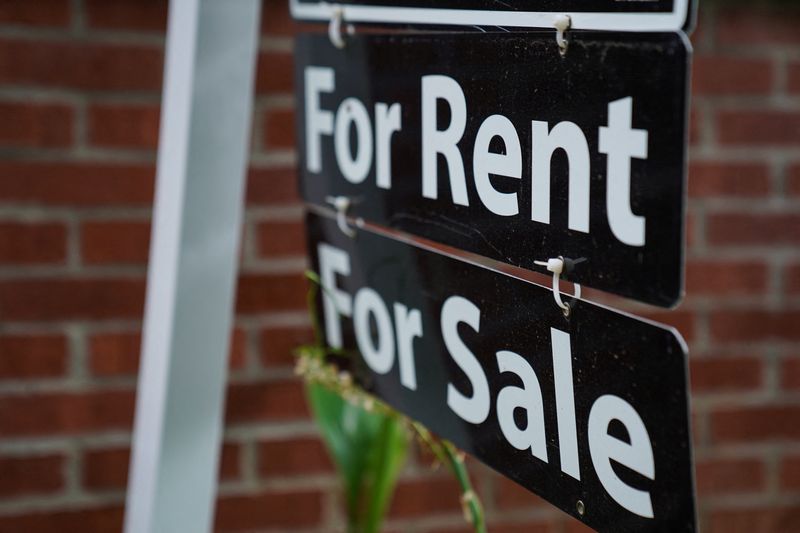
© Reuters. FILE PHOTO: A “For Rent, For Sale” sign is seen outside of a home in Washington, U.S., July 7, 2022. REUTERS/Sarah Silbiger/File Photo
By Safiyah Riddle
(Reuters) – A surge in U.S. rental home construction could soften rent prices in the months ahead, a much-awaited milestone in the Federal Reserve’s effort to tame inflation even as tightening credit conditions are beginning to take the wind out of the apartment building boom.
Groundbreaking on multifamily homes that have more than five units – a size that typically indicates apartment construction – decreased by 11.6% to 482,000 in June from a revised 545,000 starts in May, the Commerce Department said on Wednesday. Aggressive interest rate hikes by the U.S. central bank have made it more expensive to finance large-scale construction projects, and permits issued for new multifamily projects dropped last month to the lowest level since late 2020.
Despite the slowdown, the government data showed that more buildings are already on the way: Another 977,000 were already under construction last month, a fresh record high. Meanwhile, there were also 476,000 apartment buildings that completed construction throughout June, down from a three-decade peak in February 2023, but still historically high.
The apartment building boom – led regionally by the U.S. South and West – is starting to alleviate a rental housing shortage that has sent rent costs spiraling in the last two years and may at last place downward pressure on rent prices.
Indeed, the gap between the number of multifamily units under construction versus single-family homes being built is the widest in nearly 50 years.
For Fed policymakers, it may also serve as an important indication that their 500 basis points worth of interest rate hikes could be effectively cooling the rental market, even if the monthly consumer price index (CPI) figures haven’t registered the most recent trends.
“The current housing market is best described as a tale of two economies,” said Jeffrey Roach, chief economist at LPL Financial (NASDAQ:). “High borrowing costs weigh heavily on the first-time home buyer looking to get into a single-family home. However, construction activity in multi-family projects foreshadows the coming decline in rent prices as more units become available on the market.”
Rent prices soared by more than 8% on a year-over-year basis in June, contributing 70% of the upward pressure on overall inflation, even as drops in other goods and services pulled the CPI down to the smallest annual increase in more than two years at 3%, the Labor Department said in its CPI report last week. But more recent data supports the idea that inflationary pressure from rent may be tapering off.
Real estate firm Zillow reported a 4.1% annual increase in rent prices for June, on par with historic averages before the coronavirus pandemic.
At the same time, real estate analytics company CoStar Group (NASDAQ:) reported a 10-basis-point increase in the national apartment vacancy rate to 6.8% last month, highlighting an improvement in rental stock that could drive down prices if it continues to outpace demand for new leases.
“What we’re seeing in our rent data today is that rent is still going to … have significant downward pressure on CPI over at least the next two to three quarters,” said Jay Lybik, the national director of multifamily research at CoStar.
In contrast to June’s softening building numbers, sentiment in the rate-sensitive building sector has continued to improve – indicating the recent flurry of construction could be durable, despite relatively tight credit conditions and high mortgage rates. With most Fed officials supporting only one or two more quarter-percentage-point rate hikes ahead of next week’s policy meeting, builder confidence hit the highest levels since June 2022, according to a report published by the National Association of Home Builders on Tuesday.
REGIONAL DIVIDE
The deceleration in rent prices is not uniform across the country.
Some cities in the Northeast and Midwest experienced rent increases – a jump of 7% on an annual basis in Boston and 6.8% in Cincinnati in June, according to Zillow. Others in the South and West, however, have seen rent prices decrease on a year-over-year basis – Las Vegas and Austin, Texas, saw them fall 1.8% and 0.8%, respectively.
Economists say that this divergence can be traced back to differences in building activity across the country. Indeed, the number of non-single family home construction projects underway but not completed in the South and West combined is at a record 724,000, nearly three times the volume in the Northeast and Midwest.
“The markets where we’re seeing very low rent growth are the markets that are building more,” said Orphe Divounguy, a senior economist at Zillow.





